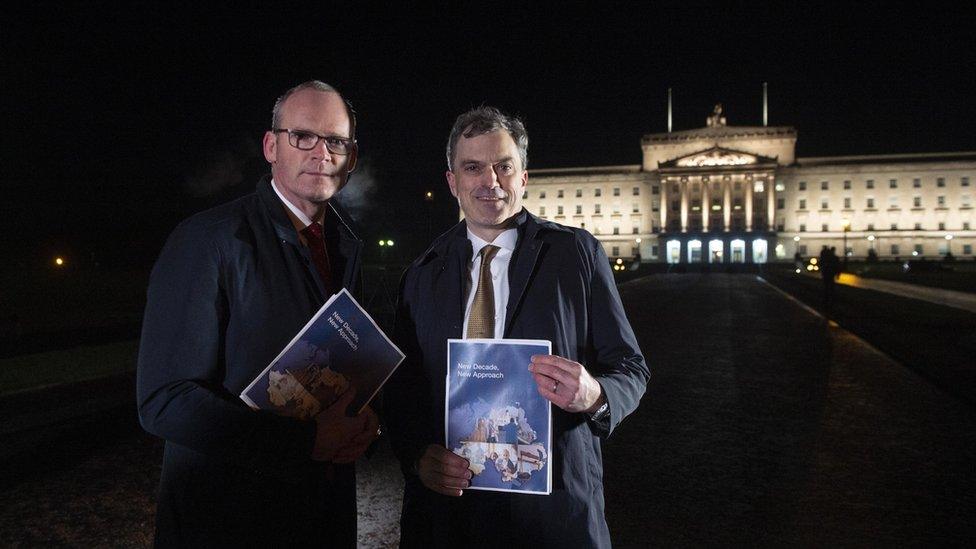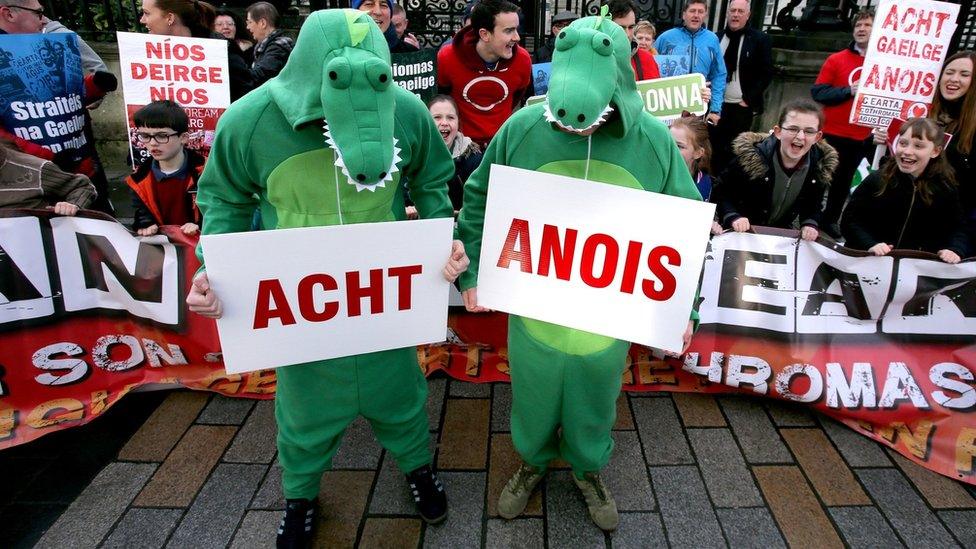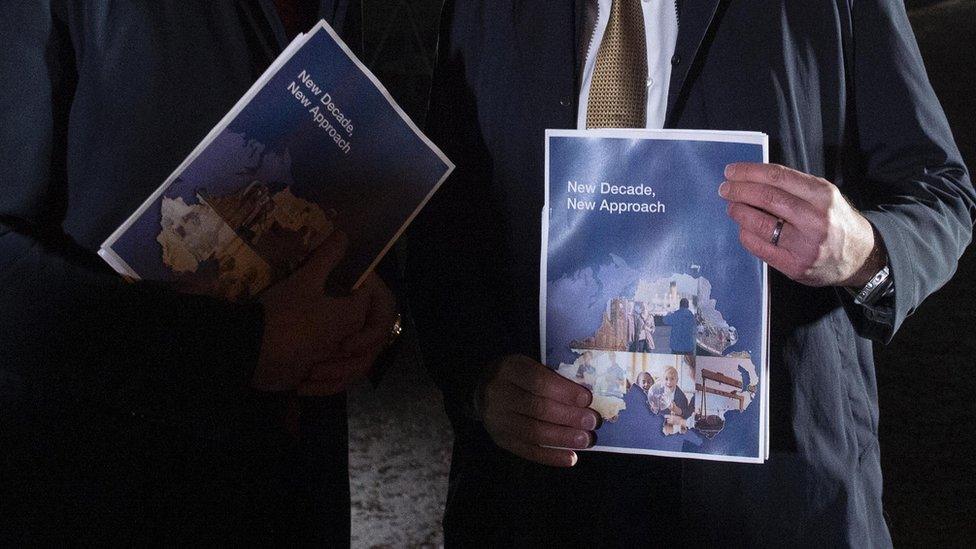Stormont deal: One year on, what's changed?
- Published

Irish government minister Simon Coveney and then-NI Secretary Julian Smith announced the draft text on 9 January 2020
On 11 January 2020, the main political parties in Northern Ireland returned to power-sharing after three years of deadlock.
They agreed to a deal, called New Decade, New Approach, external, which included timeframes for implementing commitments on health, language, legacy and the environment - but grappling with a pandemic means many of those pledges haven't progressed.
BBC News NI assesses what has changed - and what hasn't - since devolution was restored.
Health
The deal came as health workers in Northern Ireland stood on picket lines demanding an end to an ongoing pay dispute and improved staffing levels.
One year on, with the health service on the frontline against Covid-19, pay has increased and the number of nursing students in Northern Ireland has also risen, external.
The deal included a commitment of an additional 900 places over three years.
In May, Health Minister Robin Swann confirmed funding would secure an extra 300 nursing and midwifery undergraduate places in 2020/21.
There has also been progress on a mental health action plan, external, published by the department in May and an interim mental health champion, Prof Siobhan O'Neill, was appointed in June.
Arguably the commitments regarding reform of the health service and action to reduce waiting lists have seen the least progress, with efforts still roundly focused on tackling the pandemic and rolling out the vaccination programme.
The executive's pledge to fund three cycles of IVF treatment remains outstanding, but Mr Swann said he would consider using the independent sector in order to provide more capacity for the extra treatments.
Language and tradition
One of the key areas the parties disagreed on during the talks was over demands for a stand-alone Irish language act.
New Decade, New Approach committed the parties to establishing an Office of Identity and Cultural Expression, which would put in place provision for services in Irish and Ulster-Scots - but progress remains limited.
Through the office, new Irish and Ulster-Scots commissioners to enhance and develop the languages were to be appointed as well, but these processes have yet to take place.

Irish language protesters at Stormont, ahead of the deal being reached
Last year, the Executive Office estimated that the bodies would be allocated about £28m until 2022/23 but there remains no detail about how that funding will be broken down.
The Executive Office said "preparatory work" was ongoing to legislate for the core elements of the proposals.
"Legislation will be progressed as quickly as possible and the appointments of the director and commissioners will follow," it added.
It described the figure of £28m as an "early marker bid" and actual costs would depend on decisions taken by the executive and assembly.
Education
The pandemic meant schools had to close for part of last year - but some areas still saw progress.
A pay deal brought to an end the dispute with teaching unions over salary and workloads, but finding a way of resourcing school budgets sustainably still has yet to be delivered.
Other commitments requiring action include a new special education needs framework.
However, a long-standing pledge in the deal to open medical school in Londonderry saw the executive confirm funding in July, with recruitment for students beginning the following month.
The intention is to allow 70 graduate students to begin a four-year medical degree course this September.
Accountability and transparency
One aim of New Decade, New Approach was to provide the parties with a basis to alter how Stormont operated day-to-day, after the Renewable Heat Incentive (RHI) public inquiry exposed failings in the system.
Some of these proposals have made progress including the establishment of the Party Leaders' Forum, to "improve collaboration and partnership" between the executive parties on a monthly basis.
Finance Minister Conor Murphy also published a strengthened code of conduct, external for special advisers (Spads) and further capped salaries available to Spads.
However, similar proposals to improve the accountability of Stormont ministers have not been implemented.
The deal included a commitment to create three commissioners for ministerial standards to be appointed by the first and deputy first ministers.
Traditional Unionist Voice (TUV) leader Jim Allister has argued that the reforms do not go far enough, and is currently taking a private member's bill through the assembly that would legally tighten the rules on Spads.
The parties agreed to return to the executive on the basis of "good faith, mutual respect and trust" but events of the past year have both tested that pledge and led to accusations that a new approach is nowhere to be seen.
Former NI Secretary Julian Smith, who helped broker the deal, said his "biggest concern" was that a breakdown in trust would lead to more delay in taking important decisions before the assembly mandate ends next year.
Policing and legacy
The deal committed to increase police numbers in Northern Ireland to 7,500, a proposal first suggested as part of police reforms two decades ago and reaffirmed in New Decade, New Approach.
The Police Service of Northern Ireland (PSNI) currently has 6,900 officers.
The cost of 600 extra officers has been put at about £40m a year, but some have questioned the affordability of the move and discussions have been continuing between the Police Service of Northern Ireland (PSNI) and Department of Justice.
But wider plans to deal with the past remain a much harder conversation for the parties and governments.
The roots of Northern Ireland’s Troubles lie deep in Irish history
The deal included a commitment by the British government to introduce legislation at Westminster within "100 days" to implement a legacy deal struck five years ago.
It included a Historical Investigations Unit (HIU) to look into Troubles killings.
Just two months later, the government announced new plans that were a significant departure from the initial agreement - although these also have yet to be progressed through Parliament as the move divided the Stormont parties and angered some victims' groups.
The pledge by the British government to appoint Northern Ireland's first Veterans Commissioner was followed through in August, when former Ulster Unionist MP Danny Kinahan took on the role.
Climate change and environment
For years, Northern Ireland has been the only devolved administration without its own climate change legislation and targets for emissions cuts, though it does contribute to a wider UK target.
New Decade New Approach contained a number of pledges to tackle this.

Northern Ireland has one of the lowest levels of woodland cover in Europe
It committed the parties to developing a climate change strategy and establishing an independent environmental protection agency, but they are still works in progress.
At the end of last year, the environment minister launched a public consultation, external on new climate change laws, ahead of bringing any legislation to the assembly.
Other pledges
The deal included a range of outstanding issues for the parties to take action on, given the assembly had been stalled for three years - these were to be covered under a programme for government to be drawn up by the executive.
However attention quickly turned to managing coronavirus which meant the target of three months to publish a "comprehensive timetable" for developing strategies such as anti-poverty, racial equality and childcare was missed.
The Department of Finance still has yet to set up an independent fiscal council, external for Northern Ireland, which would assess the sustainability of the executive's public finances.
The deal set a timeframe of July for this - but proposals have yet to be brought to the executive.
An ad-hoc assembly committee was set up to consider the creation of a Bill of Rights for Northern Ireland - that's currently out for public consultation, external.
The executive also issued the first payments to victims of Historical Institutional Abuse (HIA), opening the redress scheme in March after legislation passed by Westminster in 2019.
However other recommendations from the inquiry, including a state apology for victims and survivors, have yet to be implemented.
Related topics
- Published10 January 2020
